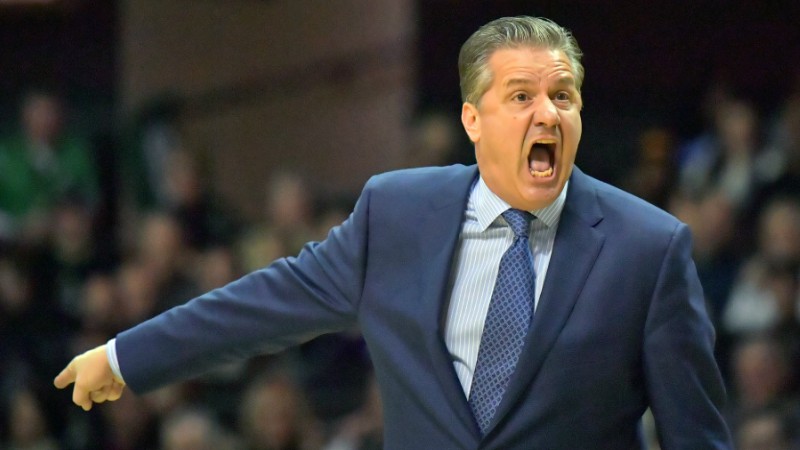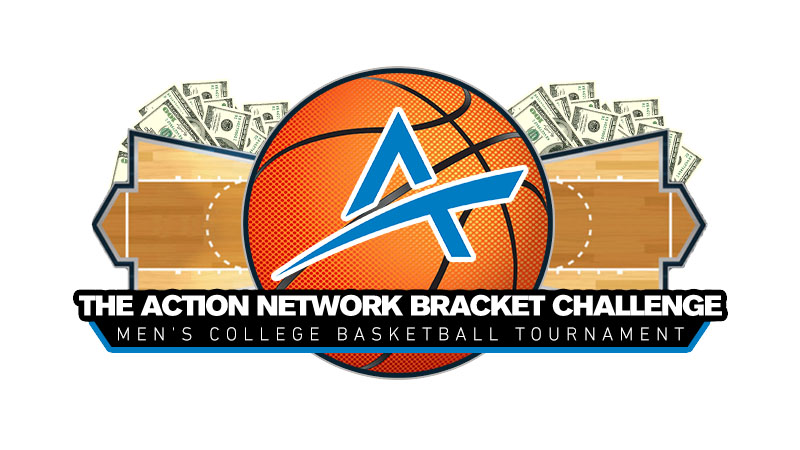Ranking Every Head Coach’s NCAA Tournament Track Record
Photo credit: Jim Brown-USA TODAY Sports
Rankings coaches in March Madness is tough. First, there's a ton of them. Second, and more importantly, different coaches have different expectations. Tom Izzo, head coach of Michigan State, for example, is a No. 3 seed and thus should win more games this tournament than Ron Hunter, whose Georgia State squad is a No. 15 seed facing a great Cincinnati squad. Thankfully, our data at the Action Network is fully equipped to tackle this problem.
This isn't a perfect study by any means, but it will attempt to put some numbers to which coaches have underperformed and overperformed relative to expectations. To create the coaching rankings, I've looked at two primary components: Longevity and performance relative to expectations. Let's touch on those for a second before we reveal the ranks.
Longevity Score
I'm scoring coaches on both number of games in the tournament and how their teams have performed in those relative to expectations. The sample goes back to the 2006 tournament. The first score, which is on a scale of 0-100, is purely how many games a coach has played in the Big Dance. This is important because the number of games correlates to how far a team went: If over a period of three years a coach plays four games per tournament, that means on average he is getting to the Elite 8. Also, using number of games — which I'm calling "Longevity Score" — gives a boost to the consistent coaches who make the Big Dance every year. Going back to Ron Hunter: The Georgia State squad with his son a couple years ago surprised and performed over expectations by winning a game. This will be Hunter's third game since 2006, so he's massively outperformed expectations in half his tournament games so far. Does that mean that he's a superior coach to Izzo? Of course not: Making it every year matters a lot.
Performance Score
It also matters how coaches do once they get there. It's tough to create expectations for a squad: Should a No. 1 seed have the expectation of making the Final Four? Where should we peg the expectations for a No. 9 seed? Thankfully, using something like total money won by the Vegas moneyline is almost a perfect data point for this. By setting a betting amount for each moneyline bet — say, $100 — we can judge a coach's performance relative to the expectations of the betting market, which is probably the sharpest way to judge them. That means a No. 2 seed losing to a No. 15 seed — the No. 2 seed would be about a -1500 moneyline favorite — would be a big deal. It also means that it's much less of a big deal when a No. 2 seed beats a No. 15 seed: That coach, per the ML on a $100 per wager bet, would garner only $6.70 profit. Moneylines are a great way of creating an expectation and then measuring the coach against it.
To the overall ranking: I'm looking at only coaches from this tournament and how they've fared since 2006 to now. Each coach who has had at least one appearance gets a 0-100 Longevity Score and a 0-100 Performance Score. The combination of those two factors ranks how well the coach has done in the Big Dance. It's not a perfect metric: Low-seeded coaches with only a couple appearances are likely a tad underrated since all they've done is merely lose to the top teams a couple times. But, alas, it's what I have.
Without further ado, here are the 2018 March Madness Coaching Rankings.
2018 March Madness Coaching Rankings
And here are the coaches who have zero NCAA Tournament appearances since 2006:
- LaVall Jordan (Butler)
- Porter Moser (Loyola Chicago)
- Brian Dutcher (San Diego St.)
- Avery Johnson (Alabama)
- Chris Jans (New Mexico St.)
- Matt McMahon (Murray St.)
- Travis DeCuire (Montana)
- Wes Miller (UNC Greensboro)
- Kyle Keller (Stephen F. Austin)
- Dan D'Antoni (Marshall)
- Earl Grant (College of Charleston)
- Dedrique Taylor (Cal St. Fullerton)
- Casey Alexander (Lipscomb)
- Mike Jones (Radford)
- Ryan Odom (UMBC)
Overperforming Coaches
For all the hate John Calipari (Kentucky) gets for popularizing the one-and-done movement, he's been incredibly successful on the big stage. First, he's been in the most games since 2006, playing in 47 — an average of almost four per tournament. That's incredible. Further, he doesn't have any bad losses: His worst was against Wisconsin in 2015 as a -242 favorite. In the whopping 24 games as a favorite of greater than -242, he's won all of them, and he's even been profitable against the spread, going 15-9 (62.5%). Cal has been a dog in the tournament seven times since 2006, and he's won five of those straight up, including the four games with the highest moneyline odds. He's been consistent in the tournament and has consistently outperformed expectations. For those reasons he's the No. 1 ranked coach in this study.
A couple other big-name coaches sit at the top of the list in Izzo and Roy Williams (UNC). Izzo has one very bad loss, losing two years ago to Middle Tennessee State by nine points as a huge -3000 favorite. That's not great, but otherwise he's been consistent, going 24-12 straight up since 2006. He's been excellent in close affairs, going 10-3 in games with a moneyline between -150 and +150; he has not lost in that type of game since 2013. Roy is not far behind Izzo, and he has an interesting coaching resume. In the 24 games since 2006 in which his Tar Heels have been a favorite of at least -260, he's a perfect 24-0. He's been a dog five times during that span, and he's 0-5 in those games. He makes the list because he 1) always gets to the tournament and 2) almost always hits expectations. I'm expecting No. 2 seed UNC to make the Sweet 16 or Elite 8 and then lose.
Shaka Smart (Texas) is perhaps the most interesting coach at the top of the rankings. He's just 7-6 straight up since 2006, but a lot of those wins came as a huge dog. Here are the four games in which he was the biggest ML dog:
- 2011 vs. Georgetown: +205 ML, Won
- 2012 vs. Wichita St.: +281 ML, Won
- 2011 vs. Purdue: +423 ML, Won
- 2011 vs. Kansas: +704 ML, Won
Since that glorious run back in 2011 with VCU to the Final Four, things haven't been pretty, especially with slightly higher expectations. Here are his five games as a favorite or small dog:
- 2015 vs. Ohio St.: +149 ML, Lost
- 2013 vs. Michigan: +137 ML, Lost
- 2016 vs. Northern Iowa: -168 ML, Lost
- 2014 vs. Stephen F. Austin: -250 ML, Lost
- 2013 vs. Akron: -350 ML, Won
Shaka's ranking is certainly buoyed by that early two-year window; he hasn't won a game in the Big Dance since that Akron game back in 2013. He's been to the tourney just once with Texas (2016), and his Longhorns are currently one-point dogs to Nevada in the first round. Will the slide continue for Smart?
I'll quickly touch on two more guys before we move to disappointments: Chris Mack (Xavier) and Jim Larranaga (Miami) have both exceeded expectations but just haven't played that many games in the tournament. They've gone 10-7 and 9-6 straight up, but their Performance Scores indicate that they outperformed as dogs in several of those. Mack's Musketeers are a No. 1 seed this season, so he'll certainly have an opportunity to better his Longevity Score.
Underperforming Coaches
There are four coaches in the field this year who have played in double-digit games in the Big Dance since 2006 and have a total 'winnings' mark of -$454 or worse. Some probably won't surprise; others might.
- Jamie Dixon (TCU): 19 games coached, 10-9 SU, -$675 lost
- Rick Barnes (Tennessee): 19 games coached, 10-9 SU, -$526 lost
- Bruce Weber (Kansas St.): 10 games coached, 3-7 SU, -$476 lost
- Tony Bennett (Virginia): 17 games coached, 10-7 SU, -$454 lost
The first three are at new schools now, likely because of their underperformance in March. Dixon has fairly stark splits since 2006: In 11 games as a favorite of -250 or more, he's won 10 straight up. In the other eight games between -217 and +216 (he's been a dog just twice), he's lost all eight. Unlike some of the other guys, he doesn't have a disastrous loss, but he's just atrocious in the close games. His Horned Frogs await the winner of the Arizona State-Syracuse play-in game.
Barnes doesn't have a bad loss on his resume either, but he's 0-4 as a dog since 2006. Weber is just 3-7 straight up in that time frame, and he hasn't had super-high expectations. Every game he's coached has been between -334 and +354, and he's lost four of the five games in which he's been an underdog. And that leads us to Bennett, who has the No. 1 team in the nation and the top overall seed in this year's affair. He's in an interesting spot: Although he's only 10-7 SU, he's 10-3 as a favorite. Presumably as the top overall seed, his Cavaliers will be favored in every game this year. He has one bad loss as a -450 favorite to Syracuse in 2016, but given how good this year's team is the coaching rankings here may undervalue him.
There are other big-name coaches with high-profile teams who have negative moneyline returns, notably Mick Cronin (Cincinnati) with -$345 in 11 games, Mike Krzyzewski (Duke) with -$308 in 32 games, Mark Few (Gonzaga) with -$243 in 31 games, and Bill Self (Kansas) with -$184 in 39 games.
I could never forgive myself if I didn't end with a note on Coach K. He's heavily penalized by his bad losses since they came in the first round, which hurts his Performance Score and also his Longevity Score. Of course, he does have multiple national championships during this period — I won't get into his easy/hard paths — but disastrous losses like his 2014 defeat to Mercer as a -1200 favorite and 2012 defeat to Lehigh as a -760 favorite are hard to overcome. He's been a boom-or-bust coach since 2006, and he currently seems to have a boom-or-bust team with dynamic athletes and a zone defense that can be torched on any given night. Duke can win the title this year — it ranks top-10 in both offensive and defensive efficiency — but this could also happen:
Photo credit: Jim Brown-USA TODAY Sports
How would you rate this article?






